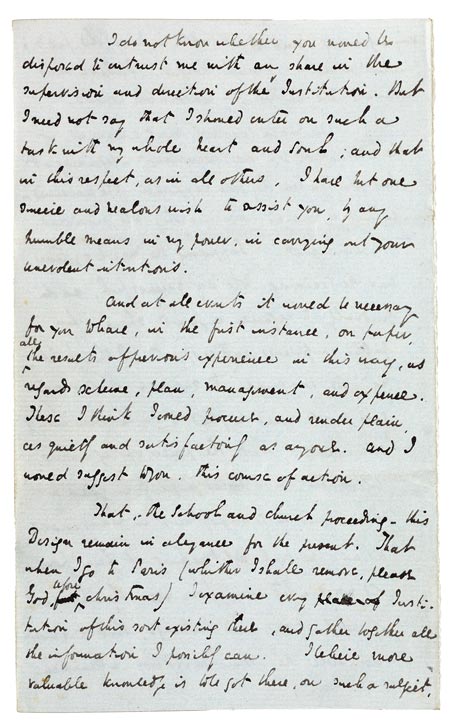
This letter is the earliest in which Dickens makes reference to the project to create a home for prostitutes and petty miscreants that would become Urania Cottage. Dickens's fourteen-page letter sets out in detail his hopes and plans for the institution: "A woman or girl coming to the Asylum, it is explained to her that she has come there for useful repentance and reform, and because her past way of life has been dreadful in its nature and consequences, and full of affliction, misery, and despair to herself. Never mind Society while she is at that pass. Society has used her ill and turned away from her, and she cannot be expected to take much heed of its rights or wrongs." Dickens never used the term prostitute in any of his letters.
Philanthropy
From 1840 Dickens guided the charitable work of philanthropist Angela Burdett-Coutts (1814–1906), the wealthiest heiress in Victorian Britain. Dickens served as her official almoner and helped to assess the merits of the thousands of letters she received from those seeking financial assistance. He also advised on her plan for improved sanitation in the slums of Westminster and drew her attention and support to the Ragged School Union, which provided education to London's poorest children. A pragmatist, Dickens encouraged Burdett-Coutts to direct her philanthropy toward the causes of distress. In 1847 they founded a home, Urania Cottage, in Shepherd's Bush, as a shelter for homeless women—prostitutes or petty criminals who sought to rehabilitate themselves by learning practical skills and developing self-discipline. Many of the women were assisted to eventually emigrate to one of Britain's colonies to begin a new life. For more than ten years, Dickens administered Urania Cottage on behalf of Burdett-Coutts and played an extremely active role in its day-to-day management.
I do not know whether you would be disposed to entrust me with any share in the supervision and direction of the Institution. But I need not say that I should enter on such a task with my whole heart and soul; and that in this respect, as in all others, I have but one sincere and zealous wish to assist you, by any humble means in my power, in carrying out your benevolent intentions.
And at all events it would be necessary for you to have, in the first instance, on paper, all the results of previous experience in this way, as regards scheme, plan, management, and expence. These I think I could procure, and render plain, as quietly and satisfactorily as anyone. And I would suggest to you, this course of action.
That,—the School and Church proceeding—this Design remain in abeyance for the present. That when I go to Paris (whither I shall remove, please God, before Christmas) I examine every Institution of this sort existing there, and gather together all the information I possibly can. I believe more valuable knowledge is to be got there, on such a subject,
